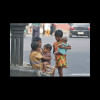What it means to be a girl

Every year, the International Day of the Girl Child serves as a reminder that the world still has a long way to go in achieving gender equality. It's a day of celebration, yes—but it's also a day to reflect on the battles girls continue to fight simply for existing.
What does it mean to be a girl in today's world? It means waking up each morning with an unspoken understanding that the world, even with its glimmers of progress, was not built for us. It means navigating a world that often insists on defining us before we have a chance to define ourselves.
It means being told from a young age to "cover up," to "be careful," and to "be quiet," while boys are seldom taught to change the way they treat girls. It means being raised in a society where our worth is often measured by how well we can mould ourselves into someone else's expectations, and not by our own desires, dreams, or abilities. It means being taught how to avoid danger rather than being empowered to challenge the systems that create that danger in the first place.
To be a girl means to exist within systems that too often fail to protect or uplift us. It means navigating a world that often does not care whether we live or die as long as the status quo remains unchallenged. In recent years, the violence against girls has only become more visible, if not more frequent. What used to be whispered about in hushed tones is now often caught on camera, shared widely, dissected for all to see, yet still rarely punished. The violence is physical, yes. But it is also psychological. It starts in the way we are conditioned to view ourselves—through the male gaze, and through societal norms that tell us our value lies in our beauty, obedience, and silence. It continues in classrooms where our voices are talked over, in workplaces where we are paid less for doing the same work, and in relationships where emotional and physical abuse are normalised or ignored.
Being a girl means being in a constant state of fear of what could happen to us. One of the most pervasive realities of being a girl is that harassment is inevitable. We are taught early on to modify our behaviour to avoid being harassed—don't walk alone at night; don't wear that dress; don't talk too loudly; don't make eye contact." The list of don'ts is endless, and behind each one is the unspoken truth—being a girl means being vulnerable, and it is our job to minimise that risk. In every space—public, private, virtual—we are asked to shrink ourselves, to make ourselves smaller, quieter, less visible, so that we might avoid the inevitable. But even these precautions rarely protect us.
To be a girl means being silent while our world is burning. Harassment is not really a consequence of what we do or say; it is the product of a system that has been designed to strip girls of their power. The burden of proof always falls on us, as if our very existence is an invitation for harassment and violence. We are asked to carry the weight of our own protection, but rarely are the systems and people that enable this behaviour held accountable. Girls who challenge the system often face backlash, whether via online harassment or physical threats. We are criticised for being "too loud," "too emotional," or "too radical."
At the heart of the girl's experience is a web of expectations. We are expected to excel academically, often outperforming our male peers, but are simultaneously steered away from certain subjects or careers. We are encouraged to be ambitious, but not too ambitious, lest we be seen as aggressive or unfeminine. One of the most suffocating expectations revolves around our own body. We are constantly bombarded with images of what we're "supposed" to be: thin, but not too weak; beautiful, but not too provocative; smart, but not as much that it offends a guy. This cycle is impossible to escape, and it creates a toxic environment where girls are made to feel that their worth is tied to their appearance. It is not just about wanting to look good—it is about feeling that, as a girl, you must look good to be loved, respected, or even acknowledged. This battle with body image is relentless.
So, what does it actually mean to be a girl? It means fighting every day against a world that was not designed with us in mind. It means living with the constant fear of violence and harassment, all while being told we are overreacting. It means feeling unsafe at all places, at all times. It means carrying the burden of all the things that could go wrong. It means being taught to stay silent when we should be screaming. It means enduring. But more than that—it means resisting. And one day, it will mean winning.
Maisha Islam Monamee is a student of Institute of Business Administration (IBA) at the University of Dhaka and a contributor at The Daily Star.
Views expressed in this article are the author's own.
Follow The Daily Star Opinion on Facebook for the latest opinions, commentaries and analyses by experts and professionals. To contribute your article or letter to The Daily Star Opinion, see our guidelines for submission.

 For all latest news, follow The Daily Star's Google News channel.
For all latest news, follow The Daily Star's Google News channel. 










Comments